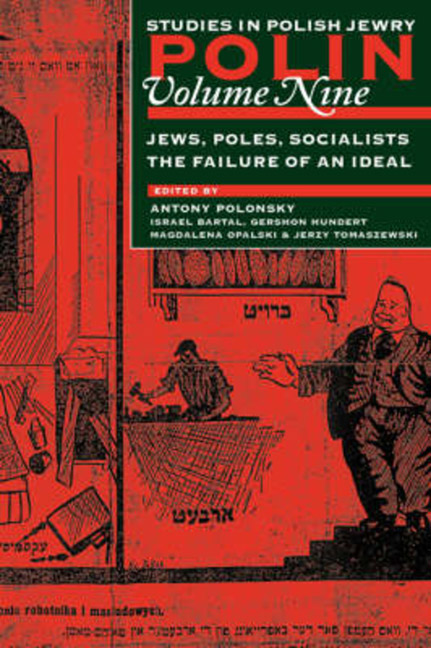Book contents
- Frontmatter
- Dedication
- Editors and Advisers
- Preface
- Acknowledgement
- Polin
- Polin: Studies in Polish Jewry
- Contents
- Note on Transliteration, Names, and Place Names
- Abbreviations
- Introduction
- PART I POLES, JEWS, SOCIALISTS: THE FAILURE OF AN IDEAL
- Jewish Socialists in the Kingdom of Poland
- The Jewish Problem in Polish Socialist Thought
- The Relation of the Polish Socialist Party: Proletariat to the Bund and the Jewish Question, 1900-1906
- The Jews, the Left, and the State Duma Elections in Warsaw in 1912: Selected Sources
- Jews and the Russian Revolution: A Note
- The Bund in Poland, 1935-1939
- Łodź Remained Red: Elections to the City Council of 27 September 1936
- The Jews of Vilna under Soviet Rule, 19 September-28 October 1939
- The Polish Underground and the Extermination of the Jews
- The Jewish Underground and the Polish Underground
- The Pogrom in Kieke on 4July 1946
- Antisemitism in Poland in 1956
- PART II NEW VIEWS
- PART III REVIEWS
- REVIEW ESSAYS
- BOOK REVIEWS
- Bibliography Of Polish-Jewish Studies, 1993
- Notes on Contributors
- Notes on Translators
- Glossary
- Index
The Jewish Underground and the Polish Underground
from PART I - POLES, JEWS, SOCIALISTS: THE FAILURE OF AN IDEAL
- Frontmatter
- Dedication
- Editors and Advisers
- Preface
- Acknowledgement
- Polin
- Polin: Studies in Polish Jewry
- Contents
- Note on Transliteration, Names, and Place Names
- Abbreviations
- Introduction
- PART I POLES, JEWS, SOCIALISTS: THE FAILURE OF AN IDEAL
- Jewish Socialists in the Kingdom of Poland
- The Jewish Problem in Polish Socialist Thought
- The Relation of the Polish Socialist Party: Proletariat to the Bund and the Jewish Question, 1900-1906
- The Jews, the Left, and the State Duma Elections in Warsaw in 1912: Selected Sources
- Jews and the Russian Revolution: A Note
- The Bund in Poland, 1935-1939
- Łodź Remained Red: Elections to the City Council of 27 September 1936
- The Jews of Vilna under Soviet Rule, 19 September-28 October 1939
- The Polish Underground and the Extermination of the Jews
- The Jewish Underground and the Polish Underground
- The Pogrom in Kieke on 4July 1946
- Antisemitism in Poland in 1956
- PART II NEW VIEWS
- PART III REVIEWS
- REVIEW ESSAYS
- BOOK REVIEWS
- Bibliography Of Polish-Jewish Studies, 1993
- Notes on Contributors
- Notes on Translators
- Glossary
- Index
Summary
POLISH-JEWISH relations tend to be treated in a one-sided way, from the standpoint of Poles and their attitude towards the Jews, so that the converse relationship-the attitude of the Jews towards the Poles-has been neglected. This one-sided approach to the question was introduced into the historical literature by Emanuel Ringelblum when in 1944, in his unfinished ‘Polish-Jewish Relations’, he concerned himself exclusively with the extent of friendship or hostility shown by the Poles. No one was prepared to depart from this precedent, and this is how the problem has continued to be approached in the intervening fifty years, both in Jewish and in Polish literature.
In Poland various other factors influenced the adherence to this traditional approach: the main ones were the language barrier, which made it impossible for many historians to take advantage of relevant sources, and censorship, an even more insurmountable obstacle. There were certainly other causes besides. The fact that Jewish historiography has kept silent on the subject is something for Jewish historians to explain.
In ‘The Polish Underground and the Extermination of the Jews’, included in the present volume, Shmuel Krakowski is perfectly justified in his decision not to concentrate on the question of Jewish attitudes. The main subject of his article is the antisemitism which found expression in the Polish underground press and equally in the dearth of concrete help from the Home Army and the People's Guard for the ghetto fighters and fugitives. Krakowski has assembled in telling fashion a number of quotations from articles published between 1942 and 1944. These texts are known to Polish historians involved in research into the period of German occupation, and many (if not all) have already been published, primarily in monographs and professional journals, though never in such a concentrated form. It is precisely this concentration which intensifies their expressive power.
Krakowski does mention, albeit briefly, the problem of Jewish involvement in Polish affairs. He approaches it in the following way. Originally, the sole reason for the positive sentiments of many Jews towards the Red Army which had invaded eastern Poland was their fear of Nazi Germany. Later, in Nazi-occupied Poland, contacts with the Polish radical Left amounted to a tactical move, occasioned by the need to find assistance in view of the lack of help from the Home Army.
- Type
- Chapter
- Information
- Jews, Poles, Socialists: The Failure of an Ideal , pp. 148 - 157Publisher: Liverpool University PressPrint publication year: 2008

